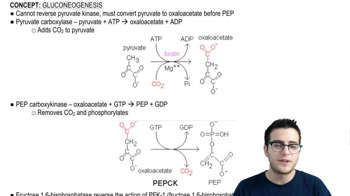24. Metabolism and Nutrition
Gluconeogenesis
Learn with other creators
Practice this topic
- Multiple ChoiceFat-soluble vitamins can be toxic if consumed in large quantities.1437views
- Multiple ChoiceNutritionally incomplete proteins are low in __________.1539views
- Multiple ChoiceProlonged high protein intake can lead to __________.1179views1rank
- Textbook Question
A/an ________ is a nutrient that the body requires in large quantities, whereas a/an ________ is one that the body requires in much smaller quantities. A/an ________ is a nutrient that the body cannot produce and so must be supplied from the diet.
873views - Textbook Question
Your friend hears about the latest fad diet that consists entirely of fat. Predict the initial effects such a diet might have on your friend's concentration, memory, and other nervous system functions. Would you recommend this diet to anyone? Why or why not?
821views - Textbook Question
Mark the following statements as true or false. If a statement is false, correct it to make a true statement.
a. Vitamins and minerals are used as fuel sources for cells.
938views - Multiple ChoiceA person who is starving is likely to exhibit __________.1164views
- Textbook Question
Which of the following yields the greatest caloric value per gram?
a. Fats
b. Proteins
c. Carbohydrates
d. All are equal in caloric value.
840views






























